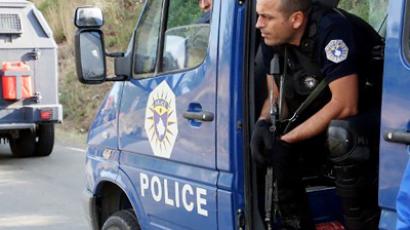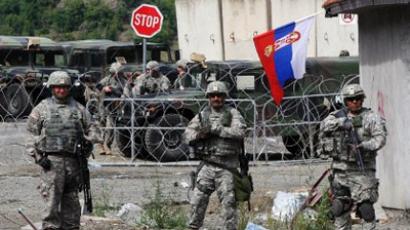Clashes on Serbia-Kosovo border: 11 wounded
A NATO spokesperson has confirmed that its troops fired on Serb protesters in the Mitrovica region. According to the statement, they were responding to an attack by the crowd.
Figures for the number of wounded vary, but hospital officials say at least seven Serb protesters and four NATO soldiers were injured. The Alliance’s representative in Kosovo, Kai Gudenoge, said Serb protesters threw pipe bombs at troops stationed along the border between Serbia and Kosovo. One soldier had to be evacuated for treatment due to the gravity of his injuries. Three others are being treated locally. The Serbian side, however, claims the attack was initiated by the KFOR peacekeepers. Eyewitnesses claim the troops fired tear gas and rubber bullets to try and disperse a crowd protesting at the Kosovar government's attempt to take over two border crossings in the north previously controlled by neighboring Serbia. According to Serb officials, at least 14 protesters were injured – and doctors view their condition as “very serious”. Following an escalation of tensions, the talks between Belgrade and Pristina scheduled for Wednesday have been cancelled. Representatives of Belgrade will instead meet with EU mediator Robert Cooper, the Serbian media reports, citing a diplomatic source. Top of the agenda is the worsening situation at the Serbia-Kosovo border.According to Serbian-Canadian documentary filmmaker Boris Malagursky, KFOR’s efforts did not stop with rubber bullets and tear gas.“At the moment, German KFOR soldiers are putting barbed wire around entire Serbian communities, turning them essentially into ghettos,” Malagursky told RT. “And the last time we saw German soldiers setting up barbed wire was during the World War II.”“NATO is not really contributing to the peaceful resolution of the problem,” Malagursky argued. “They are simply pushing ahead with their interests in North Kosovo, which are mainly economic, while the Serbs are pushed to accept everything the international community thinks is important in regard to Kosovo.”Nebojsa Malic,a Washington-based Serbian historian and author, is convinced that NATO has overstepped the limits of its mandate. Despite claiming they used rubber bullets, he argued, NATO troops used real bullets in the conflict. “They started out using rubber bullets and they switched to real, live ammunition,”he told RT.“NATO claims it was after protesters threw pipe bombs at them. Serb reports are saying that they used flares that they use at soccer games to drive off NATO troops from trying to remove a truck.”“For past 11 days ,it has been a game of nerves on the barricades with NATO setting up barbed wire and fully armed troops, and the Serbs building barricades of earth trying to block NATO,”he went on.“Many observers are saying that NATO is absolutely outside the bounds of its mandate. It is not supposed to be a law enforcement agency for the self-proclaimed government in Pristina. It was not supposed to seize this so-called customs post in the first place. And it is certainly not supposed to be shooting at people that are peacefully protesting this turn of events.”“It is very easy to improve the situation by not making it worse in the first place,”he declared.“Again, NATO command chose to escalate.”
Back in July, violence erupted when Kosovar authorities tried to take control of the border posts after Prime Minister Hashim Thaci ordered a trade ban on Serbia.The conflict resulted in the death of a policeman. Now, neither side wants to take action for fear it could once again ignite tension.Kosovo broke away from Serbia in 2008 with the support of the US and some EU countries. But Serbia and northern parts of Kosovo, as well as Russia, China and some other states, do not recognize its mandate.














